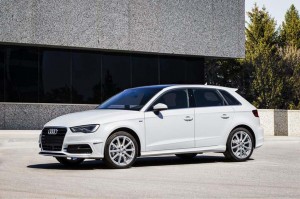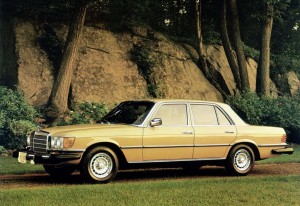
A new German court ruling legalizing bans on diesel-powered vehicles in city centers isn't likely to affect newer vehicles.
A German court issued a landmark ruling that gives several major cities permission to ban diesel vehicles from their urban centers, a move that could soon be copied by other communities across Europe.
The controversial decision is considered significant at several levels, even though it initially applies only to bans proposed by the heavily polluted cities of Dusseldorf and Stuttgart. The latter community is home to Daimler AG whose Mercedes-Benz subsidiary is heavily reliant on diesel technology for its vehicle line-up. The ruling also comes as an embarrassment for German Chancellor Angele Merkel, who had opposed such a ban.
For now, the cities only plan to restrict older, more heavily polluting diesel models, but critics of the ban fear it could place a sudden strain on the mass transit systems in the two cities while also impacting the value of as many as 12 million diesel vehicles now in operation in Europe’s largest automotive market.
Proponents have been hoping for a favorable court ruling, however, seeing it as a way to get some of the country’s dirtiest vehicles off the road. They also see the decision by the court in Leipzig as supporting broader efforts to phase out diesel technology across Europe.
(Porsche shifting from diesel to electric. Click Here for that story.)

Mercedes diesels were wildly popular in the 1970s and '80s, and the new diesel ban could impact vehicles like these.
Even as diesels lost momentum in the U.S. market during the 1980s and 1990s, the technology began making inroads in Europe as automakers came up with newer versions that overcame traditional problems with “oil burners.” They were smoother running, quicker, even more fuel-efficient and, manufacturers claimed, far cleaner than traditional designs.
As a result, diesels gained nearly half the European new vehicle market by the first half of this decade – while also starting to claw back a small share of the American market.
But that momentum largely ground to a halt when, in September 2015, the U.S. Environmental Protection Agency accused Volkswagen of rigging one of its diesels to illegally pass emissions tests. The German automaker subsequently admitted using a “defeat device” on two diesel engine, triggering a scandal that has so far cost it more than $30 billion in fines, repairs and settlements.
VW has since said it will no longer sell diesels in the U.S. and is shifting focus, even in Europe, to battery-electric technology. Its Porsche subsidiary last week said it would phase out diesels entirely over the next several years.
(Click Here for details about Ford’s new diesel engine.)
Other manufacturers are taking similar steps, Volvo is moving to an all-electrified line-up expected to eliminate diesels, though it will continue to use gasoline technology in its hybrids and plug-ins. A report by the Financial Times this week indicated that Fiat Chrysler Automobiles will drop diesels from its passenger car line-up, though it is expected to continue using them in some light truck models like the Jeep Wrangler SUV and Ram 1500 pickup. FCA has not confirmed that report but could offer insight in June when it publicly unveils a new, five-year global strategy.
Automakers may be taking their cue from the public. In Germany, diesels accounted for 33.3% of new vehicle sales in January, down from 45.1% a year earlier, according to industry figures. And demand has been tapering off in most other markets, as well.
That said, manufacturers do face potential challenges executing a diesel phase-out because they are facing ever-stricter limits on pollutants, especially carbon dioxide emissions linked to global warming. The only alternative, many believe, is to shift to zero-emissions vehicles, primarily battery-cars, but also hydrogen fuel-cell vehicles.
While Dusseldorf and Stuttgart are, at least for now, focused on banning older diesel models, some other European cities, notably including Paris, want to bar all diesels, new and old. Yet other communities are looking at banning all internal combustion engines. The entire country of Norway plans such a phase-out over the coming decade and both France and the United Kingdom are weighing similar measures.
(For more on FCA’s reported diesel phase-down, Click Here.)
In the near-term, however, some observers warn that such moves could be costly. According to various experts, owners of about 12 million diesel vehicles in operation in Germany could see their value plunge as a result of the latest court ruling. Meanwhile, there is concern that the mass transit systems in Dusseldorf and Stuttgart won’t be able to handle the increased ridership expected as diesel vehicle owners go looking for new ways to get to work.
